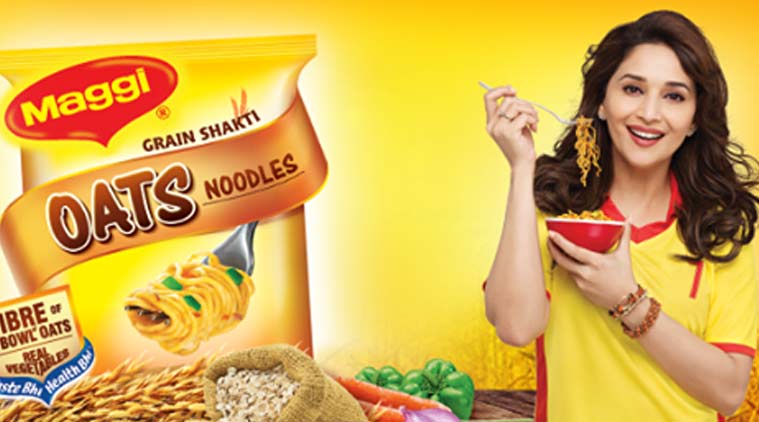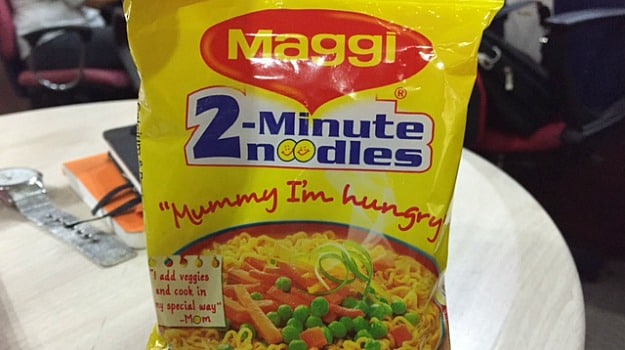உங்கள் குழந்தை நூடுல்ஸை விரும்பி சாப்பிடுகிறதா? அப்படி என்றால் நிச்சயமாக இதைப் படியுங்கள். நம் உணவு மேஜை நச்சுப் பொருட்களின் கூடையாக மாறிவருகிறது என்றால் எல்லோருக்கும் அதிர்ச்சியாகத்தானே இருக்கும்? ஏற்கெனவே நாம் உட்கொள்ளும் உணவுகள் யாவும் ஏதாவது ஒருவகையில் ரசாயனக் கலவையாகி இருக்க, இப்போது வெளிச்சத்துக்கு வந்திருப்பது நூடுல்ஸ்.
' குறிப்பிடப்பட்டுள்ள அளவுக்கு மேல் ரசாயனக் கலவை உள்ளது. அதை தடை செய்யவேண்டும்’ என்று அறிக்கை அளித்துள்ளது உத்தரப்பிரதேசத்தின் உணவுப் பாதுகாப்பு மற்றும் மருந்து மேலாண்மை நிறுவனம். உத்தரப்பிரதேசம், மகாராஷ்டிராவில் நூடுல்ஸ் பாக்கெட்களுக்குத் தடை விதிக்க தீவிரமாக ஆலோசிக்கப்படும் நிலையில், கர்நாடக அரசும் பரிசோதனை நடவடிக்கையை மேற்கொண்டுள்ளது. மற்ற மாநிலங்களும் காத்துக்கொண்டிருக்காமல் நூடுல்ஸ் குறித்த ஆய்வுக்கு உத்தரவிட முன்வர வேண்டும் என்றும் குரல்கள் எழுந்துள்ளன.
அவர்கள் அளித்துள்ள அறிக்கையில், 'உணவுப் பாதுகாப்பு சட்ட விதிகளைப் பின்பற்ற வேண்டியது உணவுப் பொருள் தயாரிப்பு நிறுவனங்களின் கடமை. அவற்றைப் பன்னாட்டு நிறுவனங்கள் மதிப்பதே இல்லை. நாம் உட்கொள்ளும் நூடுல்ஸில் சராசரியாக அனுமதிக்கப்பட்ட அளவைவிட ஏழு மடங்கு அதிகமாக ஈயம் கலந்துள்ளது. 0.012.5 பிபிஎம் (ஜீஜீனீ) என்ற அளவில் மட்டுமே ஈயம் கலந்திருக்க அனுமதி உண்டு. ஆனால், நூடுல்ஸில் 17.2 பிபிஎம் அளவுக்கு ஈயம் கலந்துள்ளது. இது குழந்தைகள், பெரியவர்கள் அனைவருக்குமே ஆபத்தானது. எதிர்காலத்தில் இது குழந்தைகளின் வளர்ச்சியைப் பெரிதும் பாதிக்கும். நரம்பு, மூளை, வயிறு ஆகியவற்றில் பிரச்னைகள் ஏற்படலாம். எனவே, மக்களின் நலன் கருதி இதனை தடை செய்யவேண்டும்’ என்று தெரிவித்துள்ளனர்.

இதுபற்றி மருத்துவர் கு.சிவராமனிடம் பேசினோம். ''நூடுல்ஸ் என்பது கார்ப்பரேட் உணவு. எங்கு பார்த்தாலும் பன்னாட்டு நிறுவனங்கள் கிளை பரப்பி தங்கள் வியாபாரத்தை நடத்திக்கொள்ள நம் சந்தையைப் பயன்படுத்தி வருகிறார்கள். இதில் பாதிக்கப்படுவது நம் மக்கள்தான். குறிப்பாகக் குழந்தைகள். நூடுல்ஸ் என்பது பட்டை தீட்டப்பட்ட மைதாவை மூலப்பொருளாகக் கொண்டு செய்யப்படுகிறது. மைதாவே கோதுமை மாவு உற்பத்தியின்போது மீதமாகும் ஒரு பொருள். அதோடு பல்வேறு ரசாயன கலவைகளைச் சேர்த்து நூடுல்ஸ் செய்யப்படுகிறது. அதிலும் முக்கியமாக மோனோ சோடியம் குளூக்கோமைட் மற்றும் காரீயம். இவை இரண்டும் சுவையூட்டுவதற்காகச் சேர்க்கப்படுகின்றன. குழந்தைகளுக்கு இது ரத்தசோகை, மூளை நரம்பு பாதிப்பு போன்றவற்றை ஏற்படுத்தும்.
 நூடுல்ஸ் என்பது அவசியம் சாப்பிட வேண்டிய உணவே அல்ல. அதில், நார்ச்சத்து, புரதச்சத்து, வைட்டமின்கள் என எந்தச் சத்துகளுமே இல்லை. ஆனால், சீனர்கள் சாப்பிடும் உணவு அவர்கள் மரபுப்படி தயாரிக்கப்படுகிறது. அதில் அவர்கள் ரசாயனம் சேர்ப்பது இல்லை. இங்கு விற்கப்படுவதெல்லாம் சீன உணவே அல்ல. தங்கள் வியாபாரத்துக்காக நிறுவனங்கள் தயாரிக்கும் நச்சுக் கலவை. மோனோசோடியம் குளுக்கோமைட் என்ற சோடியம் உப்பு சுவை ஒருவரை அடிமையாக்கும் குணம் கொண்டது. குறிப்பாக, குழந்தைகளை மீண்டும் மீண்டும் இதே உணவைச் சாப்பிட வைக்கும். ஈயம் விஷத்தன்மை கொண்டது. இதைச் சாப்பிட்டால், உடல் உறுப்புகள் பாதிக்கப்படும். நரம்புப் பிரச்னைகள் ஏற்படும். கடுமையான வயிற்றுவலி வரலாம். உடல் பருமன், உயர் ரத்த அழுத்தம், மன அழுத்தம், சிறுநீரகக் கோளாறு ஏற்படும்.
நூடுல்ஸ் என்பது அவசியம் சாப்பிட வேண்டிய உணவே அல்ல. அதில், நார்ச்சத்து, புரதச்சத்து, வைட்டமின்கள் என எந்தச் சத்துகளுமே இல்லை. ஆனால், சீனர்கள் சாப்பிடும் உணவு அவர்கள் மரபுப்படி தயாரிக்கப்படுகிறது. அதில் அவர்கள் ரசாயனம் சேர்ப்பது இல்லை. இங்கு விற்கப்படுவதெல்லாம் சீன உணவே அல்ல. தங்கள் வியாபாரத்துக்காக நிறுவனங்கள் தயாரிக்கும் நச்சுக் கலவை. மோனோசோடியம் குளுக்கோமைட் என்ற சோடியம் உப்பு சுவை ஒருவரை அடிமையாக்கும் குணம் கொண்டது. குறிப்பாக, குழந்தைகளை மீண்டும் மீண்டும் இதே உணவைச் சாப்பிட வைக்கும். ஈயம் விஷத்தன்மை கொண்டது. இதைச் சாப்பிட்டால், உடல் உறுப்புகள் பாதிக்கப்படும். நரம்புப் பிரச்னைகள் ஏற்படும். கடுமையான வயிற்றுவலி வரலாம். உடல் பருமன், உயர் ரத்த அழுத்தம், மன அழுத்தம், சிறுநீரகக் கோளாறு ஏற்படும்.
இட்லி சாப்பிட்டுப் பழக்கப்பட்ட நமக்கு ரசாயன உணவுகளை உண்ணும்போது நிச்சயமாகப் பிரச்னை ஏற்படும். வீட்டில் குழந்தைகளுக்கு நமது பாரம்பர்ய தின்பண்டங்களைப் பழக்கப்படுத்த வேண்டும். ராகி, கேழ்வரகு, சாமை போன்றவற்றில் சத்தான, சுவையான உணவுகளைத் தயாரிக்கலாம். குழந்தைகளுக்கு தாய்ப்பாலுக்குப் பிறகு திட உணவுகளைப் பழக்கப்படுத்தும்போதே பாக்கெட், டின்களில் அடைக்கப்பட்ட உணவுகளைக் கொடுத்துப் பழக்குகிறார்கள். இது தவறான ஒன்று. நம் உணவில் இல்லாத சத்து வேறு எந்த உணவிலும் கிடைத்துவிடாது'' என்றார் அக்கறையுடன்.
குழந்தைகளின் ஆரோக்கியத்தில் நாம்தான் அக்கறையுடன் இருக்க வேண்டும்!


:fill(ffffff)/http://media2.intoday.in/indiatoday/images/stories/milk-2-180_052915064541.jpg)










